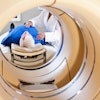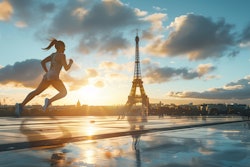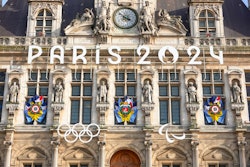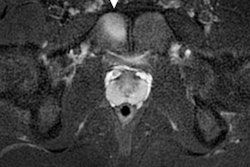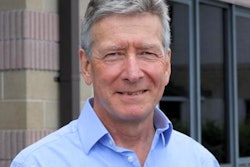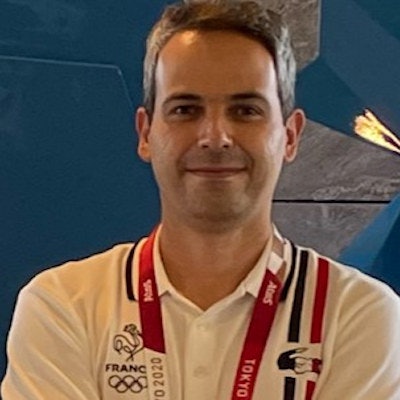
Dr. Jérôme Renoux and I have recently returned from the Tokyo Olympics, where we worked as musculoskeletal (MSK) radiologists as part of the medical staff of the French Olympic Team. We both work at the Institute of Sports Imaging based within the Sports Medicine Department of the French National Institute of Sports (INSEP) in Paris, which looks after many elite athletes.
We were on duty for the whole of the Games (20 days; 10 days for each radiologist). We had to deal with all kinds of MSK injuries, but mostly muscular, tendinous, and ligamentous injuries. Most of these injuries could be handled using ultrasound. We brought our own ultrasound machine -- not a portable one -- which was located in a room within the French team's sports medicine department we built in the Olympic Village, where the athletes were staying.
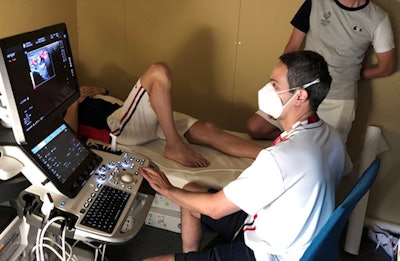 Dr. Michel Daoud Crema performs one of the 80 ultrasound examinations carried out on French athletes at Tokyo 2020. All images courtesy of Dr. Michel Daoud Crema.
Dr. Michel Daoud Crema performs one of the 80 ultrasound examinations carried out on French athletes at Tokyo 2020. All images courtesy of Dr. Michel Daoud Crema.We performed around 80 diagnostic ultrasound examinations on French athletes during the Games, as well as a few ultrasound-guided interventions. Some of the injuries -- mainly articular pathologies -- were handled using MRI, which was available at the Olympic Village's Polyclinic.
The Tokyo Games were extremely well organized, but I was not surprised by that; this is what I expected, based on what we had read about Japanese culture. It was very pleasant to work with our Japanese colleagues and volunteers.
I was a bit surprised, though, by the drastic protocols they put in place regarding COVID-19. These protocols were much more rigorous than we are used to in Europe. I was hoping to get access to some of the competition sites, but this was very difficult and, in some cases, impossible. Fortunately, I could stay within the Olympic Village, which was crowded, but most people were in a very good mood, despite the COVID-19 restrictions.
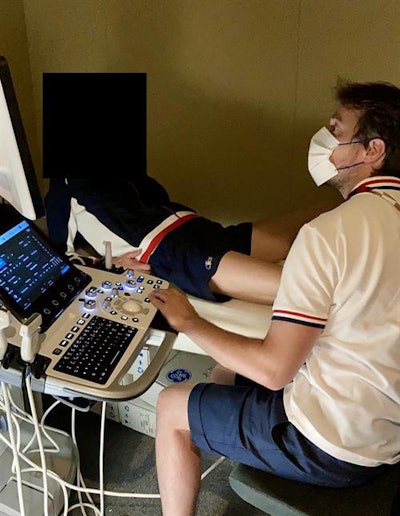 Dr. Jérôme Renoux investigates a potential injury to a French athlete.
Dr. Jérôme Renoux investigates a potential injury to a French athlete.We had to accompany our athletes to the polyclinic to perform around 10 MRIs. Again, everything was extremely well organized, but sometimes we had to be patient.
The Japanese staff in the polyclinic were extremely friendly and they did anything they could to help us, including optimizing or adding sequences. The radiographers were always in a very good mood, even when scans were being performed late in the evening.
I had the great pleasure to meet with some very good friends and colleagues there, including Professor Emeritus Kunihiko Fukuda, who was working as a volunteer at the MRI section of the polyclinic, and Dr. Bruce Forster, who was a radiology consultant for the International Olympic Committee.
Previously I worked as a volunteer radiologist in the Olympic Village's polyclinic during the Rio de Janeiro 2016 Games, and I work as a consultant radiologist for the tournaments organized every year in Paris by the French Tennis Federation: French Open at Roland Garros and the Rolex Paris Masters 1000. I also worked at the 2014 FIFA World Cup in Brazil.
Any comparisons between these events and Tokyo 2020 would be difficult due to the strict COVID-19 protocol we had to face in Japan. I'm sure if the event had not taken place during a pandemic and spectators had been allowed to come watch the Tokyo Olympics, these would be the best Games ever organized.
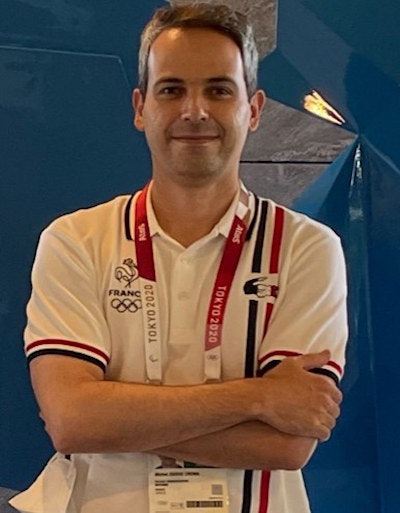 Dr. Crema is an associate senior radiologist of the Institute of Sports Imaging, located at INSEP in Paris. He now hopes to be involved in the 2024 Olympics.
Dr. Crema is an associate senior radiologist of the Institute of Sports Imaging, located at INSEP in Paris. He now hopes to be involved in the 2024 Olympics.Overall, it was a great experience in Tokyo, and we felt part of the team, celebrating when we won and being a bit disappointed when we lost. This is the beauty of sport. As we are living and working in Paris, it would be an extraordinary adventure to be part of the Paris 2024 Games.
